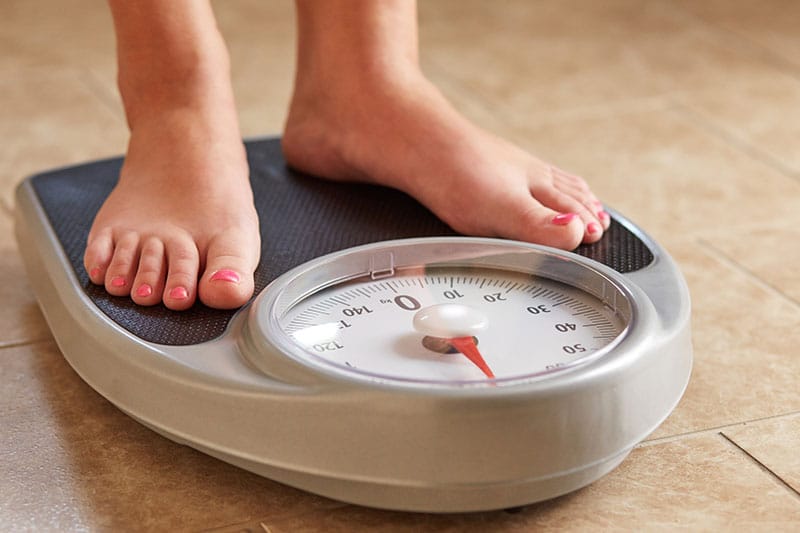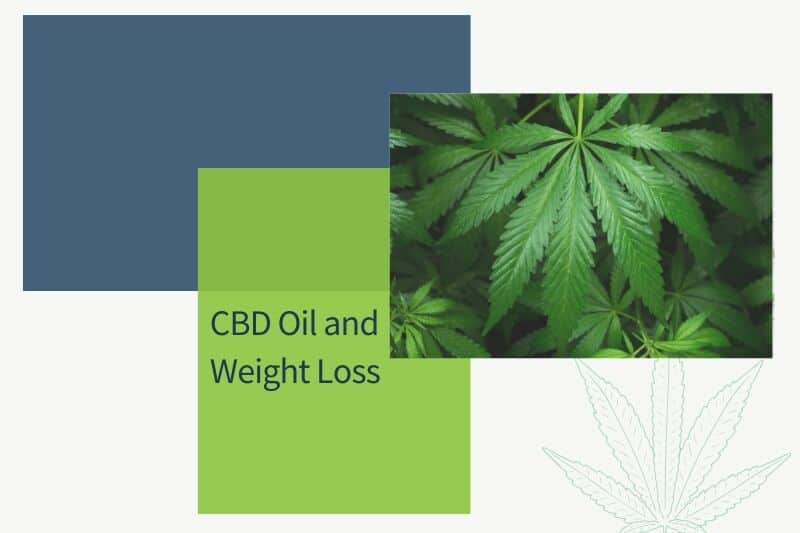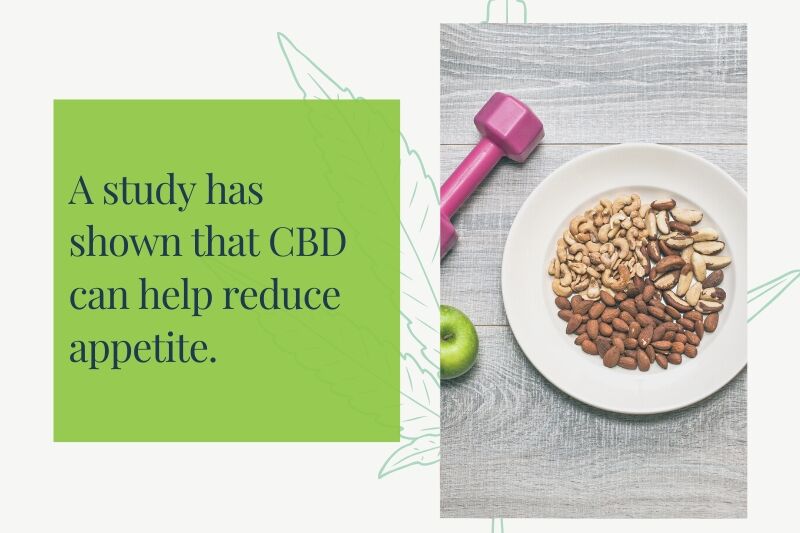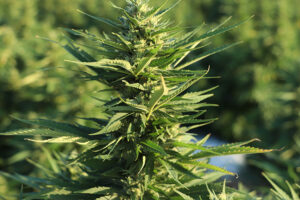Weight loss scams are a dime a dozen, with many products promising instant weight loss with no effort on your part. In a similar manner, CBD has been marketed as being able to cure depression, cancer, and everything in-between.
See all CBD oil benefits here.
While CBD has many legitimate uses, evidence on whether or not it’s useful for weight loss is relatively thin. So if you’re struggling to lose weight and need something to give you an extra boost, should you be looking at CBD?
What You Need to Know About CBD
CBD, or cannabidiol, is a cannabinoid. This class of compounds includes THC and hundreds of other chemicals extracted from cannabis plants. Research into cannabinoids has shown that they can reduce pain and inflammation, relieve anxiety, and even manage some forms of epilepsy. Now that marijuana is legal for medical use in the United States, more and more researchers are looking into the potential therapeutic effects of CBD and other cannabinoids.
Most people associate all cannabinoids with the traditional effects of marijuana, including getting high. However, it’s another cannabinoid, THC, that is responsible for the mood and psychotropic effects associated with the drug. CBD by itself doesn’t have the same psychotropic impact, and it can be taken safely without worrying about drowsiness, anxiety, or other side effects of THC.
Many products that claim to be CBD actually contain trace amounts of other cannabinoids. Since the market isn’t regulated, the standards regarding CBD purity and consistency are quite lax, which is why it’s so important to stick to reputable vendors. Isolate CBD is the purest form of CBD, with no other contaminants or additives. While there is some evidence to suggest that other cannabinoids have a synergistic effect on the functioning of CBD, it’s better to err on the side of caution and buy only the highest-quality CBD isolate you can find. Knowing the precise concentration will ensure you get a consistent dose and consistent results.
While CBD is generally safe to use, it does have side effects, including nausea and irritability in some people. It also interacts with certain medications in the same way that grapefruit does. If you’re on chronic medication, and you’re not sure whether you can take CBD alongside it, speak to your physician before trying any CBD products.
What to Consider When Using CBD Oil for Weight Loss
Many initial findings support the idea that you could use CBD for weight loss. However, if you’re planning on starting treatment, there are several considerations you should keep in mind. First, no product is going to replace a good diet and exercise when it comes to weight loss. CBD may help speed things up a bit, but it won’t do anything if you don’t change your lifestyle as well.
Also, be aware that since CBD is considered a supplement instead of medicine, the products aren’t tested by the FDA. This lack of oversight makes it easy for unscrupulous manufacturers to lie about their products and what they contain. Since CBD has become popular as an alternative therapy, it’s a prime target for these types of scams. Always buy your products from a reputable vendor and manufacturer. Companies that are serious about making high-quality CBD will often do a lab analysis of their products before sending them out to the market. Look for this certification of analysis when you buy any CBD product, as it will show you the percentage of CBD as well as any contaminants or additional compounds found in the product.
Since there have been no clinical trials on safe CBD doses for weight loss, you’ll have to figure out your dose by yourself. Many factors can affect your CBD tolerance, including genetics, weight, sex, and previous history of use. Start with a very small dose and work your way up gradually until you notice the results you want. CBD is tolerated well by the body, with some people using up to 1,500 mg per day with no ill effects. If you don’t notice the desired effect after several weeks, you should probably discontinue use simply because the product isn’t working for you.
CBD affects the cytochrome P450 enzyme that is essential for metabolizing many drugs. It works in exactly the same way as grapefruit does. If you have a medication that requires cytochrome P450 to metabolize it in the body, you should be careful of CBD as well. It’s always a good idea to speak to your physician before starting any new supplement, and the same is true for CBD. Your physician will also be able to advise you on the dose and even how you should take your CBD for the best effect.
CBD Oil for Metabolism – The role of the endocannabinoid system
There is enough anecdotal evidence to support the role of CBD in speeding metabolism, so before we get into what research says, let us look at what metabolism is and why is it important in promoting weight loss?
Metabolism and weight loss
A specific amount of energy is required by our bodies to perform essential bodily functions such as regulating blood flow and respiration. Metabolism accounts for all the processes that produce this much-needed energy.
Basic metabolic processes include the delivery of essential nutrients at the cellular level, the release of energy from food broken down by our digestive system, and the excretion of waste products from the body.
So when analyzing the connection between metabolism and weight loss, we usually look at the number of calories burned per unit of energy. Known as the metabolic rate, this can vary individually depending on health, genetics, and the amount of physical exertion.
Simply, the faster your metabolism is, the better it is for weight loss. The ability to burn more calories is how you can easily manage your weight.
Speed up your metabolic rate – CBD, the CB1 antagonist
But how does CBD help? Well, it is the effect CBD has on the endocannabinoid system that can further promote weight loss. CB1 and CB2 receptors present in the brain, digestive tract, etc. readily interact with cannabinoids such as CBD. These receptors control several bodily functions, including metabolism and appetite. Over-activation of the CB1 receptors can slow down our metabolic rate. Thankfully, CBD, being a CB1 antagonist, reduces the activation of this receptor, boosting metabolism as a result.
Influence at the cellular level – CBD and its effect on mitochondrial function
As a kid, you must have heard your science teacher saying that mitochondria are the powerhouse of the cell. She does have a solid point, though. Mitochondria are tiny rod-shaped organs present in our cells, responsible for releasing energy from nutrients and storing it into small packets (adenosine triphosphate molecules)
Imbalances in mitochondrial function can affect your ability to burn calories, making it difficult for you to lose weight. There is no need to worry because a recent study has shown that CBD can regulate mitochondrial function in the body and promote homeostasis. With increased control of the endocannabinoid system on mitochondria, CBD consumption can indirectly increase your metabolic rate.
The connection between blood sugar levels and weight loss – CBD and Insulin
Blood sugar or glucose is our primary source of energy. The amount of blood sugar present in our body has a direct impact on our appetite. Low blood sugar can make you feel hungry and less energetic. Balancing your blood sugar levels is crucial for being on the top of your game and effectively losing weight.
Our body produces a hormone called insulin (in the pancreas), which is responsible for regulating blood sugar. Insulin transports blood sugar around the body and stores it into fats, muscle tissue, and the liver. Imbalance of insulin in the body can mess this whole process up. Furthermore, high levels of insulin in the body can make it difficult for you to burn calories and, in turn, lose weight.
Although there is still much to discover about CBD, recent studies have shown that it may play a role in promoting a healthy pancreas and increasing insulin secretion in the body. A study published in the American Journal of Medicine suggests that cannabis-users had a 17% decrease in insulin-resistance as compared to other subjects, meaning that cannabis-use may increase our ability to respond well to insulin and balance blood sugar levels.
Additionally, a separate animal study conducted on overweight rats stated that cannabis was able to reduce the damage caused by obesity to insulin-secreting beta cells in the pancreas. This means that CBD may promote pancreas-health, stabilizing insulin levels, reducing the risk of diabetes, and supporting weight loss.
But what about CBD oil for weight gain?
Even though the little evidence that we have suggests that CBD oil might be beneficial for boosting metabolism and promoting weight loss, some studies have shown that it can have the opposite effect as well.
Experts say that while CBD may not have similar munchies-effect on the body as THC, it may increase appetite differently. CBD is known to relieve nausea and pain. Feeling less nausea and pain can contribute to an overall sense of wellness, which can boost appetite, make you eat more and, maybe, promote weight gain.
A study conducted on the effect of CBD for children with epilepsy gave similar results as well. A common side-effect of this treatment was appetite-change, and almost 30% of the subjects reported increased appetite due to CBD oil treatment.
With such mixed opinions about the effect of CBD on weight loss or gain, we need to conduct in-depth research on CBD as a cannabinoid and gather more evidence to come to a conclusion. The legalization of CBD products around the world has propelled efforts to achieve this.
Low-calorie CBD oil products – How many calories does CBD oil have?
There are roughly 120 calories in a tablespoon of CBD hemp oil. The way CBD oil products are packaged these days, your dosage will be much less than a tablespoon. CBD oil products such as tinctures usually come in small bottles with droppers, making them suitable for accurate dosage. These are alcohol-based CBD extracts so we are looking at a much lower calorie count (almost 7 calories per ml, if made with 190-proof alcohol). This makes it perfect for health-conscious people looking to get rid of some pounds.
Current Research
Obesity and weight loss are complex topics, so it’s impossible to say that one particular substance can 100% help you lose weight. Instead, there are several different mechanisms by which CBD can help people lose weight or prevent metabolic disorders such as Type II diabetes.
CBD may be able to help in general weight loss due to its function in the body. CBD and other cannabinoids interact with the human endocannabinoid system by binding to cannabinoid receptors. There are two main receptors: CB1 and CB2. CB1 receptors are mainly found in the brain and nervous tissue, while CB2 receptors are found in cells throughout the body. In general, CB1 receptors control neurological functions such as mood and the sensation of pain. CB2 receptors are responsible for mediating immune response and controlling inflammation in the body.
One interesting aspect of the endocannabinoid system is that CB1 receptors are widespread in fatty tissues in people suffering from obesity. This fact may suggest a link between the endocannabinoid system and obesity, which would imply that CBD can have an impact. However, there have been no studies that examine and test this link further.
Despite not being able to reduce obesity by itself, CBD may still have a role to play in weight loss. Weight gain is often a result of several factors, including high appetite, a predisposition to form white fat, and metabolic disorders. There have been a few studies looking at these aspects, investigating whether CBD can help.
Reduce appetite
Most weight-loss drugs on the market are appetite suppressors. If you don’t eat, you’ll lose weight. While most people associate cannabis with munchies, CBD is not involved in this effect. Instead, THC is responsible for the hunger pangs you get while high by stimulating CB1 receptors that stimulate the appetite.
While there have been no studies looking at the influence of CBD oil on appetite in humans, there is one mouse study that found that CBD exposure reduced appetite in rats. Researchers often use mouse and rat models in obesity studies, and many of the findings from these studies have striking parallels to human models. Whether or not this is true for CBD and appetite remains unknown, until researchers conduct further studies to examine the question.
Converts white fat into brown fat
Not all fat in your body is created equal. There are two main types of adipose tissue in the body: brown fat and white fat. Brown adipose tissue has high amounts of mitochondria. It stores fat in small droplets. The main function of brown fat is to create heat and is essential in newborns to maintain their body temperature. Conversely, white fat is stored in larger compartments to provide the body with energy during times of starvation. While it’s tempting to label brown fat as ‘good’ fat and white fat as ‘bad’ fat, the truth is that we need both types to survive. However, brown adipose tissue is useful since it burns off fat stores to create body heat. If you could convert white fat into brown fat, you’d be able to burn fat faster without expending more energy.
Researchers have shown that CBD can help convert white fat into brown fat. It can also prevent the formation of white fat, and it even promotes fat burning. It’s important to note that while these findings are very exciting, they’re also very preliminary. The study looked at cultured fat cells, which may behave very differently from fat cells in the human body. The researchers also recommend further study into this phenomenon before reaching any firm conclusions.
Full-spectrum CBD oil is the way to go!
Although CBD Isolate oils have their own benefits, we believe that several other plant compounds such as terpenes and flavonoids can make your weight loss experience more productive. Full-spectrum CBD oil has all these other compounds along with your favorite cannabinoid – CBD, for you to get the most out of it.
Compounds like terpenes slow the breakdown of CBD in the body and increase its indirect ability to support weight loss. This is known as the entourage effect. Cannabinoids usually become much more effective when combined with other compounds already present in the cannabis plant.
Conclusion
There have been no studies in humans that have looked at the role of CBD or any cannabinoid in weight loss. There are several hints that CBD may affect the endocannabinoid system, which might play a small role in weight loss and weight gain. CBD can help convert white adipose tissue into brown adipose tissue on a cellular level, and it may also help reduce appetite. While these studies provide interesting insights into fatty acid metabolism and appetite control, there is still plenty of work to be done to understand (and confirm) the effect of CBD oil on weight loss.
FAQs About CBD Oil for Weight Loss
Question: Can CBD oil help in weight loss?
Answer: CBD oil may not directly reduce obesity by itself, but it may contribute to helping to reduce weight because of its function to the body.
Question: What is CBD?
Answer: CBD, or cannabidiol, belongs to a class of compounds known as cannabinoids. These compounds are found in cannabis plants and interact with a system of receptors in our brains known as the endocannabinoid system.
Question: Is CBD safe to use?
Answer: While CBD is generally safe to use, it does have side effects, including nausea and irritability in some people. It also interacts with certain medications in the same way that grapefruit does. If you’re on chronic medication, and you’re not sure whether you can take CBD alongside it, speak to your physician before trying any CBD products.
Question: How can CBD oil help in weight loss?
Answer: CBD oil can help you in slashing your weight by reducing your appetite. If you don’t eat, you’ll lose weight. THC that is found in some CBD oil is responsible for the hunger pangs you get while high by stimulating CB1 receptors that stimulate the appetite.
Question: Can CBD increase your metabolic rate?
Answer: CB1 and CB2 receptors present in the brain, digestive tract, etc. readily interact with cannabinoids such as CBD. These receptors control several bodily functions, including metabolism and appetite. Over-activation of the CB1 receptors can slow down our metabolic rate. Thankfully, CBD, being a CB1 antagonist, reduces the activation of this receptor, boosting metabolism as a result.
Question: Does taking CBD have an effect on body’s insulin?
Answer: Recent studies have shown that it may play a role in promoting a healthy pancreas and increasing insulin secretion in the body. A study published in the American Journal of Medicine suggests that cannabis-users had a 17% decrease in insulin-resistance as compared to other subjects, meaning that cannabis-use may increase our ability to respond well to insulin and balance blood sugar levels.
Question: How many calories does CBD oil have?
Answer: There are roughly 120 calories in a tablespoon of CBD hemp oil.
Question: Can CBD oil help in converting white fat to brown fat?
Answer: Researchers have shown that CBD can help convert white fat into brown fat. It can also prevent the formation of white fat, and it even promotes fat burning. It’s important to note that while these findings are very exciting, they’re also very preliminary.
Question: Are CBD oil considered as medicine or supplement?
Answer: CBD is considered a supplement instead of medicine.











